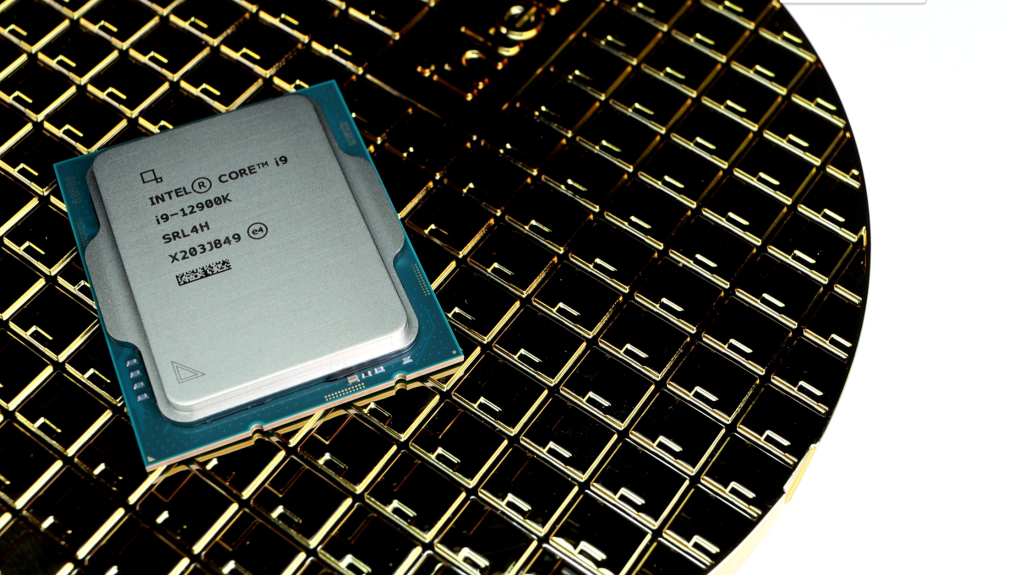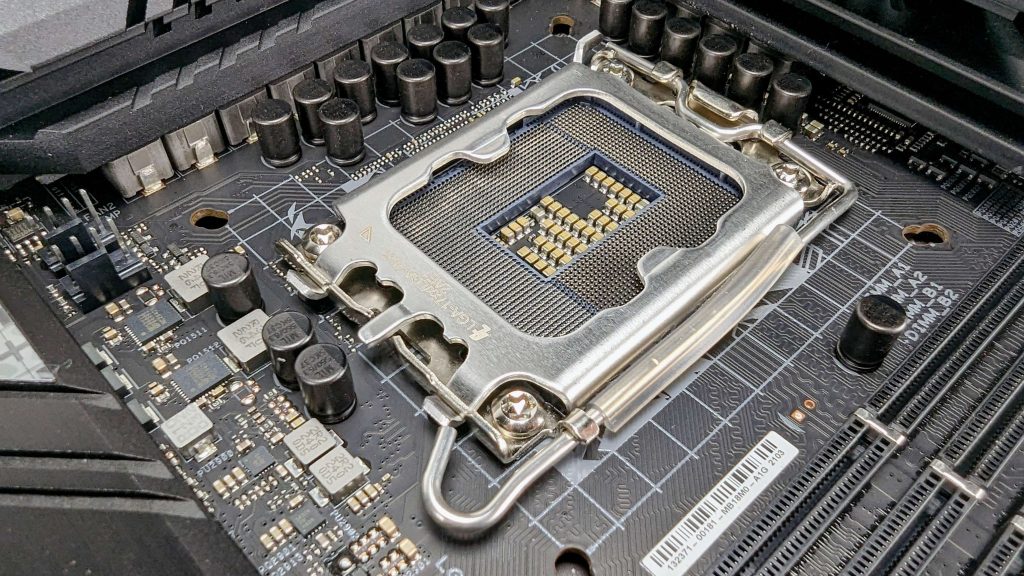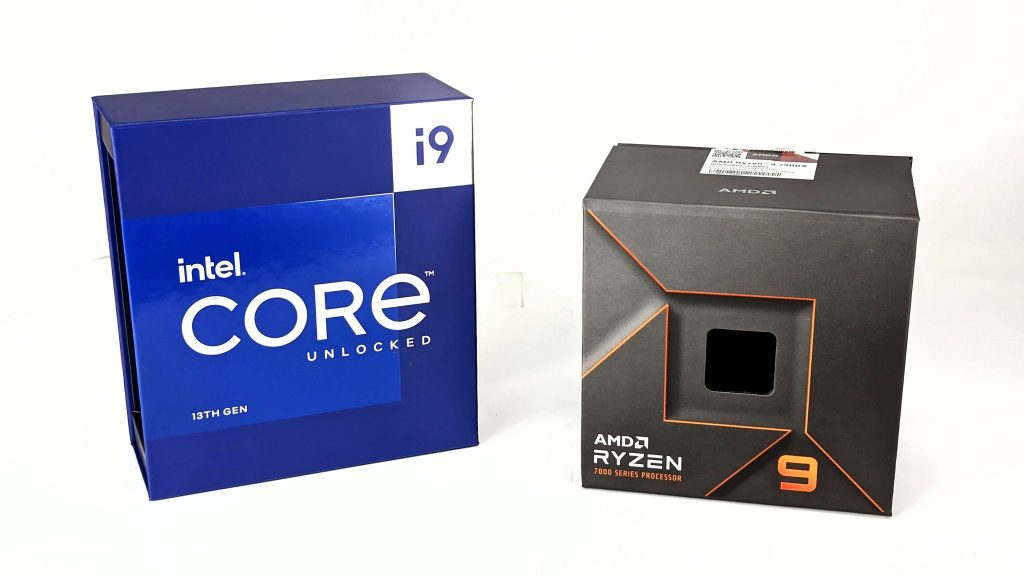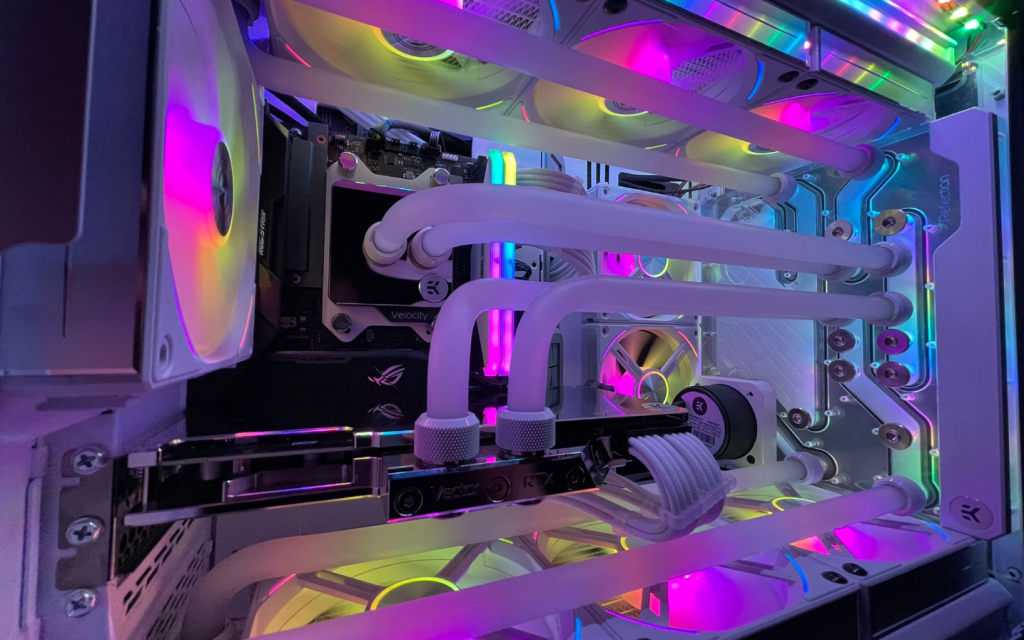
A processor, or CPU, is one of the most important components that go into a gaming PC. It's responsible for handling all of the calculations and instructions that make things run smoothly. With so many options available, it can be quite difficult choosing the right CPU for your specific needs, in this article we'll guide you through all of the available options and walk you through the process of selecting the perfect processor for your gaming PC build. 
1 - Understanding the different options
There are two brands that you'll be looking at when buying a CPU: AMD and Intel. Both AMD and Intel tier their consumer grade CPUs into 4 primary categories: 3, 5, 7 and 9. For Intel, these are i3, i5, i7 and i9, and with AMD it's Ryzen 3, 5, 7 and 9.
To keep things up to date, we'll only mention CPUs that are currently on the market, which is the Intel 12th and 13th gen, and AMD Ryzen 4000, 5000 and 7000 series.
2 - Making sense of Processor Specifications
When looking at a CPU, you'll likely be bombarded with lots of information that may be difficult to get your head around. Here we'll go through all the main specifications and give a quick description of what they mean.
Clock speed - The clock speed refers to the frequency the CPU operates at. Measured in hertz (Hz), it is a measure of how many clock cycles a CPU can perform in a given period of time, with one clock cycle representing one basic operation. A higher clock speed means that a CPU can execute more instructions per second, resulting in faster processing time. However clock speed isn't the only factor that determines CPU performance, other specs explained below also make big differences to overall speed and efficiency.
There are two types of clock speed that you'll see on a processor specification sheet, core clock speed and turbo clock speed. Core, or base clock speed, is what you'll see the CPU running at under normal conditions, but when things start to hot up the turbo clock speed will kick in and dynamically increase the clock speed when additional processing power is needed. For Gaming PCs, we really only need to take into consideration the turbo clock speed as this is the speed your CPU will be running at when you're gaming!
Cores & Threads - A CPU core is a processing unit within the processor, modern CPUs have multiple cores but this wasn't always the case. Nowadays, a modern CPU that you'd consider putting in your gaming PC will have between 4 and 24 cores. The number of CPU cores can have a huge impact on gaming performance, which is why you see higher tier CPUs paired with similar tiers of Graphics Card and RAM, to create a well rounded PC specification.
Intel and AMD both have slightly different ways of managing the amount of cores in a CPU, with AMD it's quite simple as all of the cores are created equally so a 16-Core AMD Ryzen 9 7950X3D has 16 cores which are all to the same specification. For Intel however, it's slightly different as they have a certain number of Performance-cores, and also Efficient-cores too. The difference between these two types of cores is quite self explanatory, the performance-cores are designed for performance applications with a higher clock and turbo speed (up to 5.8 GHz in some cases!), and the efficient-cores are designed to run at a lower clock speed for tasks that don't require much processing power, in order to run at a lower TDP, therefore generating less heat and using up less electricity! The P-Cores also have hyper threading, which is a virtualisation technology which allows a single CPU core to behave as two logical threads, improving performance in applications that can take advantage of multiple CPU cores.
CPU Threads are a product of the above mentioned CPU virtualisation, this technology is called Hyper Threading on an Intel CPU, and SMT (Simultaneous Multi-Threading) on AMD processors. When it comes to running games, we should be focusing on both the core and thread count, as they both play an important role.
Cache - CPU cache is a small amount of very fast memory which is used to store data and instructions that need to be frequently accessed. The benefit of it being part of the CPU, is that the processor doesn't need to store this information in the main memory which can be slower due to the higher latency of accessing data stored in RAM. In modern CPUs, there are three levels of CPU Cache: L1, L2 and L3. Level 3, or L3 is what you want to pay the most attention to as this is the larger volume which makes the most difference when it comes to gaming performance. The king of cache comes in the form of AMD's 3D V-Cache™ Technology, which is a technology which essentially makes the cache much faster to access by placing it physically on top of the silicon of the CPU core.
TDP - Thermal Design Power, or TDP measures the total power consumption under full load. It is measured in watts and determines how much cooling you need for the CPU. A higher TDP means you need a higher end CPU cooler. Most CPU coolers will list a maximum TDP, which you'll need to compare against your CPU's listed TDP to make sure the processor will be sufficiently cooled.
Socket Type - CPU socket type refers to the physical design of the socket on your Gaming PC's motherboard. Choosing the correct socket type is very important when speccing a PC, as if you get it wrong the CPU simply won't fit in the motherboard, or the PC won't POST!

3 - Choosing the Right Processor for Your Needs
Budget Considerations - Here at UK Gaming Computers, we often see people spending way too much money than they need to on a CPU. Spending a higher than required chunk of your budget on your processor can have a negative effect on total gaming performance, as you'll have less money to spend on the component that does most of the heavy lifting when it comes to gaming, the Graphics Card. Of course there are times where you should pair something like an Intel i7 with a lower tier Graphics Card like an Nvidia GTX 1650, but in general, you'll want a balanced setup. We've put together a rough table of our recommendations below. Please bare in mind this is only a rough guide, and to contact us if you need assistance speccing up your dream PC from UK Gaming Computers!
| GPU | UKGC Recommended CPU |
| Nvidia GTX 1650 | AMD Ryzen 3, or Intel Core i3 |
| Nvidia GTX 1660 Super & RTX 3050 | AMD Ryzen 3 or 5, Intel Core i3 or i5 |
| Nvidia RTX 3060 & 3060 Ti | AMD Ryzen 5, or Intel Core i5 |
| Nvidia RTX 3070 & 3070 Ti | AMD Ryzen 5 or 7, Intel Core i5 and i7 |
| Nvidia RTX 3080 & 4070 Ti | AMD Ryzen 7 or 9, Intel Core i7 |
| Nvidia RTX 4080 | AMD Ryzen 7 or 9, Intel Core i7 or i9 |
| Nvidia RTX 4090 | AMD Ryzen 9 or Intel Core i9 |
AMD vs Intel - The question that completely splits all PC hardware enthusiasts? Team Red or Team Blue? What should you choose? Well, it's not actually that complicated. Intel is almost always going to be the more expensive option, but has generally been better when it comes to top end gaming performance, until recently with the AMD 7000 Series CPUs with the 3D suffix which signifies the previously mentioned 3D V-Cache technology. If you're on a budget, AMD is generally always the way to go as they offer slightly better value for money. Some games can better utilise single core performance, in that case you'll be wanting to go for an Intel CPU. If you're a livestreamer, go with AMD as they handle video encoding very well.

Best Processors for Different Gaming Scenarios - The CPU you choose really depends on what sort of things you plan on using your PC for.
- Entry-Level Gaming - As AMD is the king of budget, this is where you'll want to be choosing an AMD Ryzen 3 or 5 from the 4000 or 5000 series. These sort of CPUs pair perfectly with any GPU up to an Nvidia RTX 3050 so even though they're cheap, they still pack a suitable punch!
- Mid-Range Gaming - For a mid-range gaming system, AMD Ryzen 5 or 7, or Intel i5 or i7 is where you want to be looking. For AMD you'll want something like an AMD Ryzen 5 5500, 5600X or Ryzen 7 5700X, and for Intel stick with a 12th or 13th generation chip such as the Intel Core i5 12600k or 13600k, or Intel Core i7 12700/ 13700.
- High-End Gaming - For the top tier of gaming there's also an AMD and Intel option. For AMD, the 7000 series is the way to go, with the Ryzen 7 7700X, up to the blazing fast AMD Ryzen 9 7950X3D which is currently the best CPU for gaming that money can buy. On the Intel side, the new Intel Core i7 13700k is very good value for money and boasts i9 levels of performance fo i7 money, or you can go all out and go for the i9 13900k.
- Livestreaming - AMD Ryzen is fantastic when it comes to livestreaming, as the CPUs manage video encoding very impressively, meaning you'll be able to output a higher quality livestream when compared to other CPU options. When selling PCs designed for livestream, we'll generally recommend the AMD Ryzen 7 5700X as a minimum, but if your budget is lower an AMD Ryzen 5 would do a decent job too.
- Other uses - There are other pieces of software away from gaming which could skew your CPU choice. For example, the Adobe suite of software has considerable optimisations for Intel CPUs so we would always recommend Intel over AMD. Many different piece of software will have optimisations and potentially limitations related to the CPU, so it is best to check the recommended specifications for the piece of software you're looking to run and choose a CPU accordingly, or you can speak to us and we'll use our years of experience to do that for you!
4 - Overclocking and Cooling
Overclocking your Processor - CPU overclocking is the art of changing the CPU's frequency multiplier and voltage to boost the clock speed to a higher than standard level. With modern CPUs you can expect increases between 5 and 20% which can equate to quite a performance boost, potentially even for free! Overclocking does have it's downsides however, such as higher temperatures, decreased lifespan and potential stability issues over time.
Cooling your Processor - Choosing a suitable CPU cooler is almost as important as choosing the right processor. You want to make sure that the listed cooling capacity is greater than your CPU's listed TDP. There are three types of cooling when it comes to Gaming PCs:
- Air Cooling - This is the most basic form of cooling, which consists of a heatsink with a fan attached to it. If a CPU comes with a stock cooler, it will be some form of air cooler. Air cooling is suitable for all but the highest end CPUs, with models like the CoolerMaster Hyper 212 EVO being capable of cooling AMD Ryzen 7s and Intel Core i7s.
- AIO Watercooling - All in one liquid coolers are the next step up, and consist of a CPU block, pump and radiator. The radiator would mount to one of the fan spots in your case, away from the CPU, it will also have fans attached to draw air through the radiator. Bringing this heat away from the CPU improves cooling potential, meaning a higher TDP CPU can be sufficiently cooled.
- Custom Watercooling - A custom loop is the holy grail of PC Cooling, and is one of the services that we offer at UK Gaming Computers that puts us above and beyond what other system builders offer. The idea is similar to the AIO coolers, as they consist of CPU (and sometimes GPU) waterblock, radiator, pump and reservoir. The radiators will be made of copper instead of aluminium, meaning the cooling potential is greater than an AIO, even if the radiator size is the same. The special part of custom watercooling is the tubing in between the components, being custom, you can make the loop quite special.

Choosing the right CPU for your build can be a daunting task, but by understanding the processor specifications, considering your budget, and thinking about your gaming needs, you'll be able to make an informed decision. With the right processor choice, you'll be able to enjoy a smooth and immersive gaming experience for years to come.
Should you need any further assistance in choosing the perfect CPU for your dream Gaming PC build, you can speak to one of our experienced engineers who can walk you through the options for your build.

